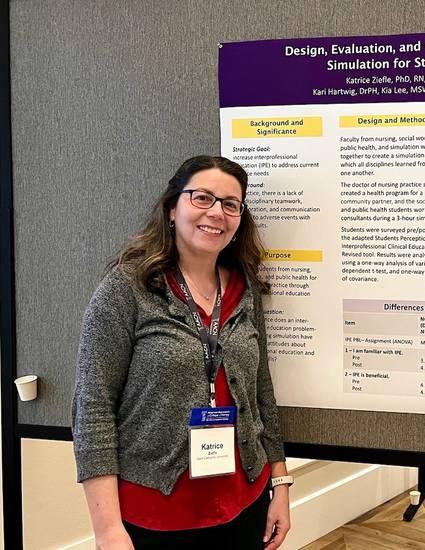
Presentation
Interprofessional Simulation for Student Health Professionals
American Association of Colleges of Nursing/ Doctoral Education Conference
(2023)
Abstract
Background: An academic school of health has a strategic goal to increase interprofessional education (IPE) through innovative teaching strategies. In practice, there is a lack of interdisciplinary teamwork, collaboration, and communication leading to adverse events with costly results. In order to prepare health professionals for the complex healthcare environment, IPE opportunities are essential.
Purpose: The purpose was to prepare students from nursing, social work, and public health for collaborative practice through an IPE simulation. The faculty asked, what influence does an interprofessional problem-based learning simulation have on students' attitudes about IPE and leadership?
Methods: Interdisciplinary faculty created a quality improvement consultation simulation in which all disciplines learned with, from, and about each other. Based on a needs assessment, the doctor of nursing practice students developed a health program proposal for a community partner. The social work and public health students worked as consultants during a 3-hour simulation posing questions and providing feedback from their discipline-specific perspective. Students were surveyed pre/post using the adapted Students Perceptions of Interprofessional Clinical Education Revised tool.
Results: Results were analyzed using a one-way analysis of variance, dependent t-test, and one-way analysis of covariance. There were statistically significant improvements in perceptions of IPE (p < 0.001) and perceptions of the level of IPE importance (p < 0.004).Limitations: Scheduling a simulation was challenging across three programs. Interprofessional education understanding varied among students and faculty based on prior education, practice exposure, degree level variance from bachelor’s to doctorate, and faculty comfort facilitating an IPE-simulation debriefing.
Conclusions/Implications: This study demonstrates promising findings. Healthcare professional students value the interprofessional engagement of quality improvement and leadership simulation activities, which will improve outcomes for individuals and the community. Future research within an academic setting considerations include: time, training for faculty, repetition of experience, and evaluation of IPE simulations.
Keywords
- Simulation,
- Interprofessional,
- Healthcare Professionals
Disciplines
Publication Date
Winter January 20, 2023
Location
Coronado, California
Citation Information
Katrice Ziefle. "Interprofessional Simulation for Student Health Professionals" American Association of Colleges of Nursing/ Doctoral Education Conference (2023) Available at: http://works.bepress.com/katrice-ziefle/10/
